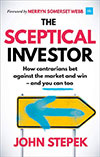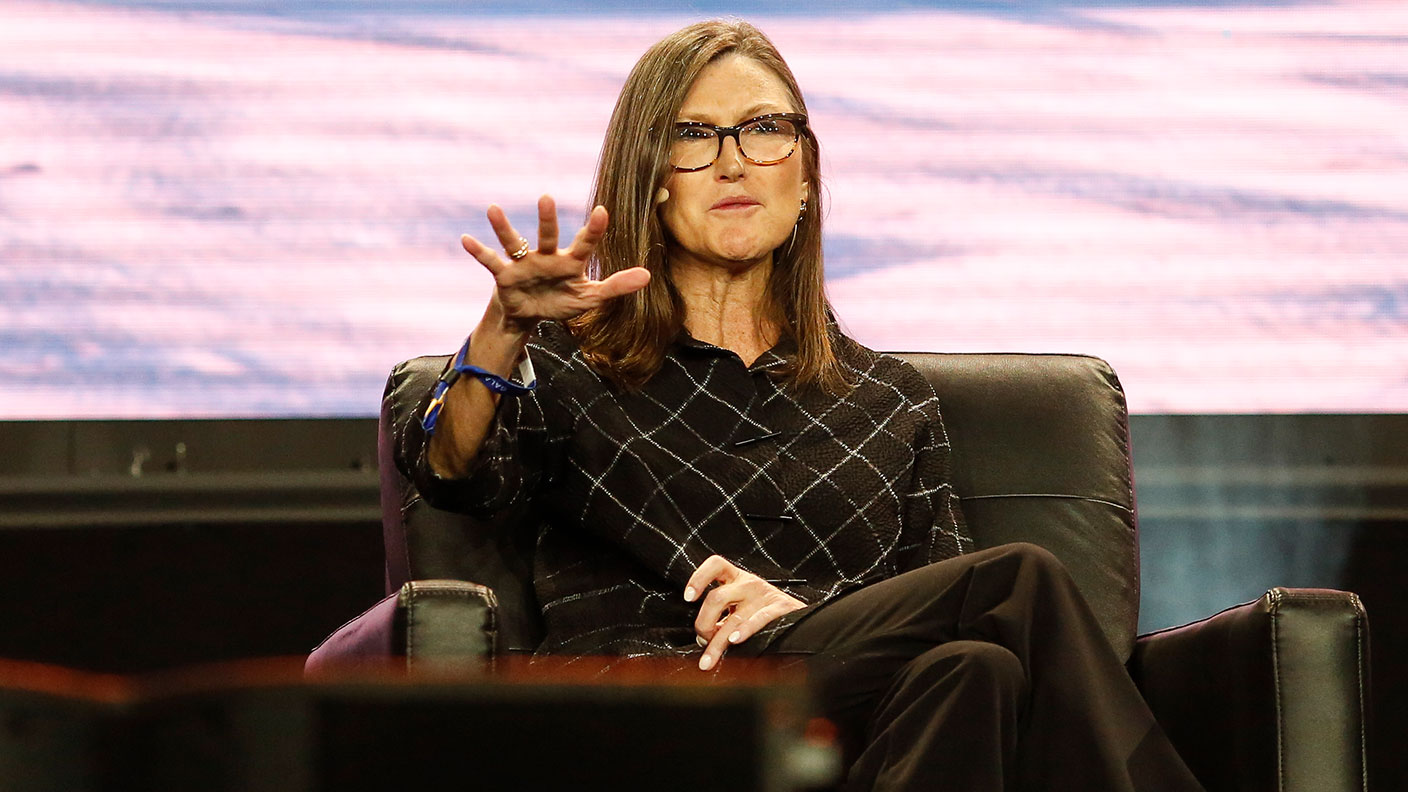Running with the crowd is bad for your finances – here’s how to resist it
To be a good contrarian investor, you have to avoid being swayed by the crowd. John Stepek explains how to go about it.

Get the latest financial news, insights and expert analysis from our award-winning MoneyWeek team, to help you understand what really matters when it comes to your finances.
You are now subscribed
Your newsletter sign-up was successful
Want to add more newsletters?

Twice daily
MoneyWeek
Get the latest financial news, insights and expert analysis from our award-winning MoneyWeek team, to help you understand what really matters when it comes to your finances.

Four times a week
Look After My Bills
Sign up to our free money-saving newsletter, filled with the latest news and expert advice to help you find the best tips and deals for managing your bills. Start saving today!

This morning, we've got another extract from The Sceptical Investor for you.
I published the book with Harriman House last year. It's all about contrarian investing or as I've rebranded it, sceptical investing.
To help you kickstart your finances in the New Year, Harriman are offering a cracking deal on the book right now. You can get 40% off by ordering it here, and entering the code SCEPTIC40 at the check-out.
MoneyWeek
Subscribe to MoneyWeek today and get your first six magazine issues absolutely FREE

Sign up to Money Morning
Don't miss the latest investment and personal finances news, market analysis, plus money-saving tips with our free twice-daily newsletter
Don't miss the latest investment and personal finances news, market analysis, plus money-saving tips with our free twice-daily newsletter
This morning's extract is about how to avoid being swayed by the crowd.
How to resist the lure of the herd
As investment author and analyst Michael Mauboussin points out, a good contrarian has to be ready to go "against the crowd when the gap between fundamentals and expectations warrants it".
That's hard enough, but it's made harder by the fact that "the widest gap often coincides with the strongest urge to be part of the group ... prices not only inform investors, they also influence investors".
In short, the desire to be part of the "in group", and the potency of the stories that have been constructed to back up its world view, are hardest to resist, just when a more sceptical opinion is likely to prove most valuable. So how do you resist falling in with the crowd?
1. Get comfortable with being uncomfortable
Jeremy Grantham, co-founder of US asset manager GMO, built a behavioural investment model with his colleague Ben Inker (using US stocks) to try to explain why the price that investors are willing to pay for a given level of earnings (the price/ earnings (p/e) ratio) goes up and down over time.
Their goal was to find out which characteristics of markets make investors more willing to buy at higher p/es.
One thing to remember when considering this is that corporate profit margins tend to revert to the mean over the long run. This is a critical feature of free market capitalism (and one which many argue has been undermined by the recent long period of low interest rates, although we won't get into that here).
If one company makes unusually high profits in a sector, other entrepreneurs will target the opportunity too. The resulting competition drives profit margins down.
So when margins are unusually high, rational investors operating in an efficient market should be reluctant to pay a high p/e, because they know that profits should fall in the future. Similarly, when margins are low relative to the long-term average, investors should be willing to buy at higher p/es, because they know that the "e" side of the equation is due to rise in the near future.
Investors don't feel comfortable with cheap markets
That, of course, is not what Grantham and Inker found. Instead, they found that investors are much keener to buy stocks when profit margins are high. "Investors would dependably pay up for high margins, which would then decline, whacking them on the way down."
Investors also pay more when inflation is low; and when GDP growth is relatively stable. In short, the closer to perfection that economic and corporate conditions are, the more investors are willing to pay for a given level of earnings.
They want to see blue skies everywhere before they buy, despite history proving over and over again that grey clouds inevitably darken blue skies, and that peak profits inevitably decline. It's almost as though they imagine that this time, the good times will last forever, and tomorrow will look almost exactly like today, only better.
Grantham describes these features high margins, low inflation, stable growth as "comfort factors", and points out that human beings will pay a high premium for them, and always have (at least, going back to 1925, which is where GMO's model ends).
"Investors' extreme preference for comfort, like human nature, has never changed." This desire for comfort and fear of discomfort, says Grantham, explains all of the bubbles and troughs during that period (except 2000, when US stocks were even more overvalued than "comfort factors" would explain alone).
When you combine this finding with what we know about human beings craving security first and foremost, and the way this drives their "expansionary" (greedy) and "contractionary" (fearful) impulses, it makes perfect sense. Investors want everything around them to confirm that they are making the right choice before they take a risk.
But this craving is a disaster when applied to something as cyclical as financial markets. Investors' tendency to extrapolate today's conditions far into the future means that the expansionary impulse is strongest when conditions can't possibly get any better which is, of course, precisely the point at which you should be in full-blown contractionary mode, consolidating your gains before the next storm hits.
So get used to feeling uncomfortable. As Howard Marks of Oaktree Capital puts it: "Most great investments begin in discomfort.
The things most people feel good about investments where the underlying premise is widely accepted, the recent performance has been positive and the outlook is rosy are unlikely to be available at bargain prices.
Rather, bargains are usually found among things that are controversial, that people are pessimistic about, and that have been performing badly of late. But it isn't easy to do things that entail discomfort." Or as financial writer and adviser Barry Ritholtz puts it: "Easy trades are rarely lucrative ones."
In short, you want to be risking money when your gut and heart are stuck in defensive, fearful contractionary mode, and you want to be very careful of having money at risk when your gut is in greedy expansion mode, and screaming at you to buy. As contrarian manager Ned Davis put it: "What feels right, easy, and obvious in your gut is quite often wrong."
2. You will never be popular cultivate mental toughness
In the fairytale, The Emperor's New Clothes, there's a reason it has to be a child who points out that the emperor has no clothes on it's because most adults have long since realised that it's more pleasant to be wrong and part of the in' crowd, than right and isolated.
Where the fairytale got it wrong is in the idea that people are grateful or happy when their mistaken ideas are challenged or even proved wrong. People will do just about anything to defend their point of view.
This is a well-documented phenomenon known as motivated ignorance. It turns out that people's desire to be part of a shared reality' is so strong that they'll go out of their way to avoid hearing an opinion that disagrees with their strongly held views.
In one study by researchers led by Jeremy Frimer and Matt Motyl at the University of Winnipeg, published in the Journal of Experimental Social Psychology, 200 people were asked to read an essay and then answer questions on same-sex marriage.
They could choose to read the view they agreed with, or to read the opposing view. If they read the opinion they agreed with, they were entered into a raffle to win $7. If they read the opposition essay, they were entered into a raffle to win $10.
It looks like a no-brainer one option clearly offers a better prize for the same amount of effort (reading an essay) with no obvious downside. In a narrowly rational world, no one should have opted for the $7 option. Yet, in fact, 63% went for it. In other words, nearly two-thirds of the respondents preferred to have their views unchallenged, rather than have the chance of winning more money.
Those on both "left and right", the study concludes, "are motivated to avoid hearing from the other side for some of the same reasons: the anticipation of cognitive dissonance [the unpleasant sensation of discomfort you get when your brain is trying to reconcile two conflicting points of view] and the undermining of a fundamental need for a shared reality with other people."
As George Orwell put it back in 1945: "People can foresee the future only when it coincides with their own wishes, and the most grossly obvious facts can be ignored when they are unwelcome."
So you need to be able to put up with the fact that, even when (or if) you are proved right in your scepticism, there will be no lasting plaudits, only financial rewards. People would rather be wrong, and emotionally comfortable, than allow you to upset their world view (which, after all, they perceive as a mortal threat).
And if you ever put a foot wrong again, they will be waiting to pounce and to point out your errors, as a way of demonstrating that their worldview is superior to yours.
How do you develop this mental toughness? Many sceptics see themselves as "outsiders". More than a few of the fund managers and other investors I researched and talked to in the course of writing this book had either spent time moving around as children or had in some other way felt slightly detached from their peer group.
And if you think about the archetypal investment contrarians out there, they tend either to fall into the angry young man stereotype (hedge fund managers) or the worldly-wise old man, tutting at the folly of the world, stereotype (Warren Bu ett and Howard Marks, for example).
Sometimes this is just a pose, and sometimes it's just an excuse to be argumentative, and you certainly don't have to be a friendless outcast or the pub bore to be a sceptical investor. But you do have to have confidence in your own analysis and the ability to take the opinions of others with a big pinch of salt.
As Mauboussin puts it: "Many successful investors have a skill that is very valuable in investing, but not so valuable for life: a blatant disregard for the views of others."
Of course, one way to get around all of this is simply not to share your opinions with others. You're not a hedge fund manager trying to drum up business, and you're not a talking head on CNBC. You're a private investor.
So be private. Being right when everyone else is wrong is not the goal. Making money is the goal. As long as you do that, you've succeeded. The other market participants need not know that you achieved it by betting in the opposite direction to them.

Buy the book now at a massive discountEnjoyed this sample? Get the book for 40% off just enter SCEPTIC40 at the checkout.
Your usual Money Morning is back on Monday until then, have a lovely weekend!
John Stepek
Executive editor, MoneyWeek
Get the latest financial news, insights and expert analysis from our award-winning MoneyWeek team, to help you understand what really matters when it comes to your finances.

-
 Should you buy an active ETF?
Should you buy an active ETF?ETFs are often mischaracterised as passive products, but they can be a convenient way to add active management to your portfolio
-
 Power up your pension before 5 April – easy ways to save before the tax year end
Power up your pension before 5 April – easy ways to save before the tax year endWith the end of the tax year looming, pension savers currently have a window to review and maximise what’s going into their retirement funds – we look at how
-
 Are UK house prices set to fall? It’s not so simple
Are UK house prices set to fall? It’s not so simpleAnalysis Figures suggest UK house prices are starting to slide, but we shouldn’t take these numbers at face value, explains Rupert Hargreaves.
-
 Tesco looks well-placed to ride out the cost of living crisis – investors take note
Tesco looks well-placed to ride out the cost of living crisis – investors take noteAnalysis Surging inflation is bad news for retailers. But supermarket giant Tesco looks better placed to cope than most, says Rupert Hargreaves.
-
 It may not look like it, but the UK housing market is cooling off
It may not look like it, but the UK housing market is cooling offAnalysis Recent house price statistics show UK house prices rising. But John Stepek explains why the market is in fact slowing down and what this means for you.
-
 Think the oil price is high now? You ain’t seen nothing yet
Think the oil price is high now? You ain’t seen nothing yetAnalysis The oil price has been on a tear in recent months. Dominic Frisby explains why oil in fact is still very cheap relative to other assets.
-
 What can markets tell us about the economy and geopolitics?
What can markets tell us about the economy and geopolitics?Sponsored Markets have remained resilient despite Russia's war with Ukraine. Max King rounds up how reliable the stockmarket is in predicting economic outlooks.
-
 The tech bubble has burst – but I still want a Peloton
The tech bubble has burst – but I still want a PelotonAnalysis Peloton was one of the big winners from the Covid tech boom. But it's fallen over 90% as the tech stock bubble bursts and and everything else falls in tandem. Here, Dominic Frisby explains where to hide as markets crash.
-
 The market is adjusting to a new “short dreams, long reality” world
The market is adjusting to a new “short dreams, long reality” worldAnalysis As interest rates rise, things are starting to change, says John Stepek. Reality is biting back. Gone are the fanciful ideas built on hope – a business now needs a solid foundation.
-
 Are UK house prices heading for a fall?
Are UK house prices heading for a fall?Analysis UK house-price growth is slowing as interest rates rise. But interest rates aren’t all that matters for house prices, says John Stepek.